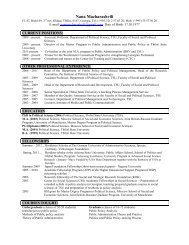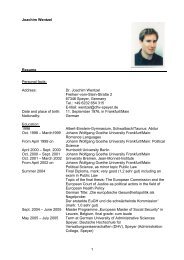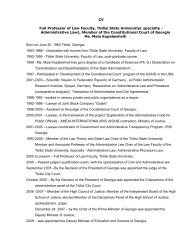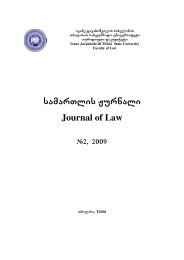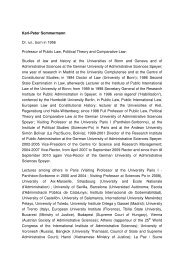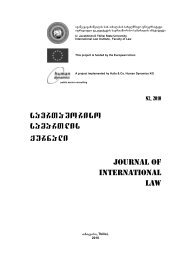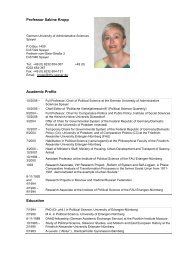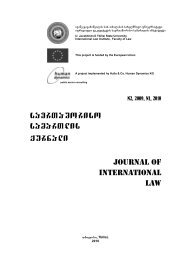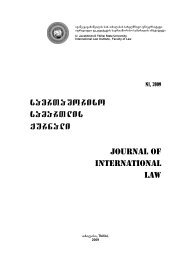Untitled
Untitled
Untitled
You also want an ePaper? Increase the reach of your titles
YUMPU automatically turns print PDFs into web optimized ePapers that Google loves.
K. KHUTSISHVILI, SHALL PROTECTION OF SOVEREIGN IMMUNITIES SUPERSEDE PROTECTION...<br />
ternational crimes perpetrated by those representing<br />
state and claiming respective immunity<br />
from prosecution 37 .With the gradual development<br />
of human rights doctrine plodding<br />
erosion of doctrine of sovereign immunity took<br />
place.<br />
It is broadly accepted that the Nuremberg<br />
Charter and its Judgment stand as cornerstones<br />
in recognizing the concept of individual<br />
criminal responsibility for international<br />
crimes, including of those protected by immunities.<br />
However, before the Nuremberg trials<br />
there was the Versailles Treaty 38 and for our<br />
analysis it is important to mention that the first<br />
wave of change was noticed already after the<br />
World War I 39 , when the Kaiser Wilhelm II was<br />
announced to be falling under the jurisdiction<br />
of a “special tribunalp constituted to try the<br />
accused.” 40 The Report of the Commission on<br />
the Responsibilities of the Authors of the War<br />
on the Enforcement of Penalties further stated:<br />
“… the Commission desire to state expressly<br />
that in the hierarchy of persons in<br />
authority, there is no reason why rank, however<br />
exalted, should in any circumstances protect<br />
the holder of it from responsibility when<br />
that responsibility has been established before<br />
a properly constituted tribunal. This extends<br />
even to the case of heads of states”. 41<br />
Though this was a considerable challenge to<br />
the notion of state sovereignty at the early<br />
stage of change of perception in this regard,<br />
the Report of the Commission further “proposed<br />
the establishment of a high tribunal<br />
composed of judges drawn from many nations,<br />
and included the possibility of the trial before<br />
that tribunal of a former head of a state with<br />
the consent of that state itself secured by articles<br />
in the Treaty of Peace.” 42 The reservation<br />
referring to the “consent of [the] state”<br />
can be understood if we take into consideration<br />
level of development of the concept of<br />
individual criminal responsibility for grave international<br />
crimes of persons covered by immunities<br />
at the time when the Versailles Treaty<br />
was concluded. Despite this reservation, the<br />
stated principle remains to be an important<br />
breakthrough in the perception of interrelation<br />
of state sovereignty and protection of<br />
humans from outrageous carnage. The same<br />
Report further noted: “If the immunity of a sovereign<br />
[…] would involve laying down the principle<br />
that the greatest outrages against the<br />
laws and customs of war and the laws of humanity,<br />
if proved against him, could in no circumstances<br />
be punished […] such a conclusion<br />
would shock the conscience of civilized<br />
mankind.” 43<br />
Thus, even though in an extremely rudimentary<br />
form and even though, never realized<br />
in practice, the conclusions after the<br />
World War I recognized possibility of neglecting<br />
the absolute protection of sovereign immunity<br />
and subjecting even Sovereign to prosecution<br />
for exceptional outrages. 44 Therefore<br />
the Versailles Treaty stands out for its initial<br />
and at that time unprecedented recognition<br />
of criminal responsibility of a head of state.<br />
The next positive development in relation<br />
to disregarding the claim of immunities was<br />
marked at Nuremberg, where prosecution of<br />
the highest level state representatives for international<br />
crimes took place. “The [IMT] Charter<br />
did… establish unequivocally, the principle<br />
of individual criminal responsibility under<br />
international criminal law… irrespective of any<br />
mandates under national law, and irrespective<br />
of the doctrine of Act of State and other<br />
immunities...” 45<br />
The pronouncement by the Nuremberg<br />
Tribunal of individual criminal responsibility for<br />
international crimes was not an end to development<br />
of this concept. Developments in international<br />
law prompted a need for further<br />
elaboration of the principles, and the Nuremberg<br />
Principles 46 followed, reaffirming importance<br />
and overall recognition of a principle of<br />
criminal responsibility of leaders perpetrating<br />
international crimes.<br />
As Cassese argues, “[t]he traditional rule<br />
whereby senior State officials may not be held<br />
accountable for acts performed in the discharge<br />
of their official duties was significantly<br />
undermined after the Second World War, when<br />
international treaties and judicial decisions<br />
upheld the principle that this ‘shield’ no longer<br />
protects those senior State officials accused<br />
of war crimes, crimes against peace, or crimes<br />
against humanity. More recently, this principle<br />
has been extended to torture and other<br />
international crimes.” 47 The re-established<br />
world order needed some more time to once<br />
again return to the principle recognized by the<br />
Article 7 of the International Military Tribunal<br />
Charter and try highest ranking state officials,<br />
when they ignored plea for justice of thousands<br />
of their own or other states’ nationals<br />
and perpetrated international crimes. This<br />
69



